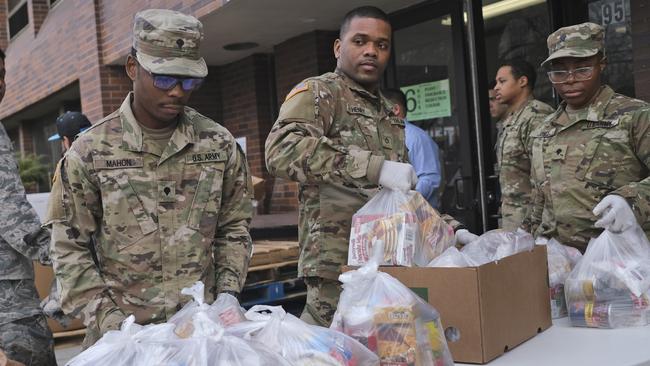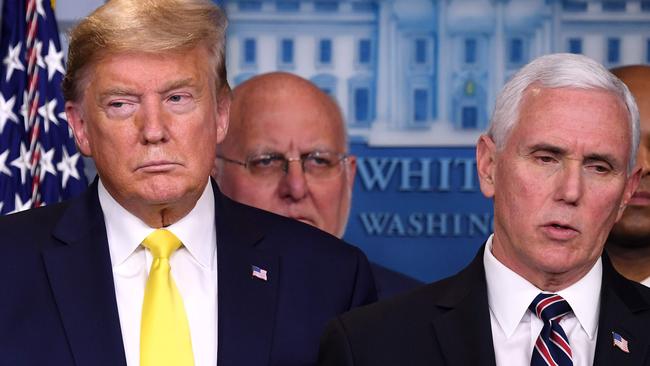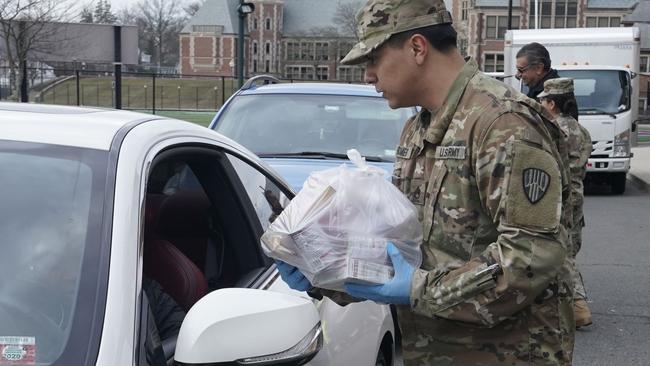US government’s management of COVID-19 mishandled at every step
America’s mishandling of COVID-19 runs many layers deep, but this regulation-obsessed, litigation-averse country is in no way ready for what’s coming, writes US correspondent Sarah Blake.
Last week I arrived home from a five-day work trip to find an empty pantry and just a few toilet rolls.
That’s business as usual at my place, with two working parents and two teenage boys who eat about eight meals a day, plus snacks.
Australia was already making headlines for its loo paper panic; travel bans had just been imposed in Italy, and there was increasing talk about 14-day isolation periods for those infected with COVID-19.
So I went to my local megastore and dropped $650 on groceries (a personal record), to cover us just in case we were locked down. At that stage, the queue at the Costco cash registers in Port Chester, Westchester County, was about evenly weighted between those who nudged each other and pointed at my towering pile of supplies, and those who, like me, were perhaps overdoing it.
Yesterday, when I made my way past the police officer on crowd control into the same store, it was a completely different story. The wall of toilet paper was no more, and just a few packs of kitchen paper and serviettes remained. People were pushing past each other with dead-eyed conviction to get to the non-perishables. It felt like it could easily have gotten ugly as the line to pay stretched about 100m to the back of the store.

This is not a lighthearted postcard, because America, like a lot of places, is pretty tense at the moment.
There has been a lot of talk about the US fumbling its initial coronavirus response, and a lot of political mudslinging at a time when we should not be subjected to partisan nonsense, so I won’t bore you with their squabbles. But we live ten minutes from America’s virus hotspot of New Rochelle, with a one-mile containment zone being supported by the National Guard, and it’s feeling a bit personal.
The temple that closed after a local lawyer identified as “patient zero” was infected is where my youngest son has soccer practice.
A school in the suburb that starts at the end of my street was one of the first in New York to close, and we believe it’s a matter of days before the high school where my boys are in their last two years of study shuts down.
I’m not going to blame the White House for what’s happened here, because the ineptitude runs many layers deep – from local through to the federal government – and it’s been building for years. But what I will say is that this form-loving, regulation-obsessed, litigation-averse country is in no way ready for what’s coming.

And that is in large part to the rules, paperwork and senseless bureaucracy that has for example, stopped testing kits from being rolled out, shut down doctors who tried to cowboy their own tests and left people waiting more than a week for a diagnosis.
As of yesterday, the US had conducted just 11,709 tests, and according to the Centre for Disease Control, some of those were on the same person multiple times. This for a population of 330 million is woeful when compared with South Korea’s testing of 20,000 people a day.
The circular illogic of hearing Donald Trump say that tests are available for everyone who wants them (by no means true), and that the outbreak is contained (an impossible thing to know given so few people have been tested), is wearing thin.
It’s little wonder doctors here are warning the health care system will likely be overwhelmed in a matter of weeks.
I know we like to talk about how in Australia we have too many fun police stopping us from getting a straight scotch after midnight, but you haven’t experienced stubborn officialdom until you’ve come up against a clipboard-wielding American.

My first encounter with this wall of apathy came when I tried to get a drivers license on an uncommon foreign journalist visa in New York. I am not exaggerating when I say I have lost multiple days to the triangle between the foreign press centre next to the UN, the downtown social security office and midtown Department of Motor Vehicles to make sure I had the necessary paperwork for our little family to drive legally.
If you move here from Australia, most of your children’s immunization record from home dosn’t apply, so our boys have had to be revaccinated after a lifetime of on-time shots in order to go to school.
I make these points for just a small illustration of how the time-wasting and rigid adherence to rules that binds Americans is one of the main reasons it seems like the country is broken.
It’s maddening, even a funny story at the pub, when it slows down your every day life.
But it’s not funny when it’s a matter of life and death, and the inexcusable series of delays in this country to getting on top of the virus are exactly that.
